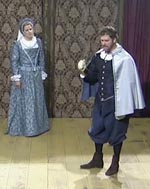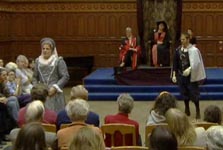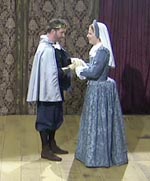- Edition: King Leir
King Leir
- Introduction
- Texts of this edition
- Contextual materials
- Facsimiles
110King Leir, Scene 16
Cast
Cordella: Julian DeZotti
Gallia: Paul Hopkins
Scene 16 features two virtuous characters being nice to each other and it was hard for the SQM actors to discover an element of conflict that would drive the scene and give them something to 'play'.
Performing the Gallian King (Sc. 16)
111Read about Performing Gallia in Scene 4.
Initially this scene was a struggle for Paul Hopkins (Gallia). The prince is presented here as a "mirror of virtue" (TLN 1275), just like his wife, but playing into this ideal left the scene very flat. The formal rhetorical style only exacerbated the issue. As rehearsals developed, Hopkins found support in the text for the idea that the King is a fun-loving young man with a fondness for disguise and adventure. He felt that this scene may be motivated by frustration with his new wife whom he has showered with attention and love but who continues to mope around the palace. Hopkins and DeZotti experimented with this idea in rehearsal finding that it helped drive the scene forward. When pushed to an extreme it became funny but at the expense of our perception of the sincerity of Cordella's grief and Gallia's nobility. It is hard for us to appreciate today the beauty of Cordella's forbearance and dedication to her father, which by modern standards might appear priggish. In scenes like this I monitored the cultural context, taking perhaps an overly conservative view, but the actors' desire to give full life to their characters and find more playable moments counterbalanced my conservativism while still honoring the spirit of the play's original context.
112As the performance developed the actors found they could maintain their characters' dignity by exploiting feelings of impatience. The scene became more and more flirtatious as the prince tried to woo his queen out of her sorrowful mood. Gallia's call for her to "[e]mbrace the joys" (TLN 1256) and "be blithe and frolic" (TLN 1292), as well as his choice metaphor of the "root" that will "make [her] flourish with perpetual spring" (TLN 1247), were all coloured with a young man's passion for his lover. But at the end of the scene, Hopkins' Gallia was completely convinced by Cordella's argument (TLN 1258-1274) and performed his response: "Mirror of virtue, Phoenix of our age!" (TLN 1275) with deep sense of his growing admiration for his wife. In the performance in the West Hall of University College (UofT) Hopkins (Gallia) directed this line to the Dean of the college sitting in state at the back of the stage, as if presenting his wife as en exemplar for the assembled audience. His admiration led in turn to a conviction to resolve the conflict with her father, promising not to cease until they are reconciled. It was clear that the last resort of sailing to England was an appealing one to our adventurous prince.
Read more about Performing Gallia.
Watch video of Scene 16 on the Performing the Queen's Men website.
Performing Cordella (Sc. 16)
113Read about performing Cordella in Scene 13
DeZotti (Cordella) had to balance Cordella's pain, caused by her father, with her love for her new husband. Both emotions characterize her as a "good woman," dutiful to the two patriarchal figures in her life. Considering Cordella's resistance to her father in terms of marriage this scene is perhaps making the important point that a woman can choose her own spouse and still honour her father. Freedom of choice in matters of marriage was a key issue, of course, for the company's patroness. Gallia's argument that she has been grafted now to "another stock" (TLN 1244) echoes her distinction between duty owed a father and that owed a husband at the start of the play but his suggestion that she should "[f]orget [her] father" (TLN 1248) perhaps pushes the argument too far. Cordella wishes to return her husband's joy with joy but ultimately she is subject to "nature's power" (TLN 1264): her filial love constrains her freedom to express the love and duty she bears her new husband (TLN 1274).
Read about performing Cordella in later scenes
Watch video of Scene 16 on the Performing the Queen's Men website. (The video footage is password protected. Click on "Cancel" in the pop-up window to obtain password.)




